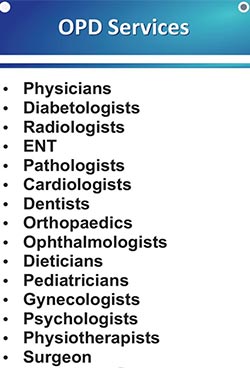A MBBS graduate or General Physician is trained to give primary health care and is generally the first point of care to the patient. MBBS Doctors or General Physicians do the preliminary investigation and recommend a basic treatment plan for different types of diseases, illnesses or injuries. In certain cases they also recommend consultations through a specialist or super specialist based on their initial investigation.
Dentists take care of your oral problems. They remove tooth decay, fill cavities, examine x rays, place protective plastic sealants on children’s teeth, straighten teeth, and repair fractured teeth. They also perform corrective surgery on gums and supporting bones to treat gum diseases. Dentists extract teeth and make models and measurements for dentures to replace missing teeth. They also administer anesthetics and write prescriptions for antibiotics and other medications.
Dietitians are specialists in food and nutrition. They give suggestions to individuals on what to eat and what to keep away from to keep up a healthy life and also to accomplish a particular health related aim. They evaluate patient’s needs and diet; create meal plans keeping in mind the cost and patient’s choice.
MD Physicians are doctors who prescribe, recommend or furnish medicine or drugs, or perform any surgical operation of whatever nature by the use of any surgical instrument, procedure, equipment or mechanical device for the diagnosis, cure or relief of any wounds, fractures, bodily injury, infirmity, disease, physical or mental illness or psychological disorder, of human beings. They examine patient’s health problems using some pathology tests. Based on the results of pathology tests, they advice the exact treatment and prescribe medicines to heal the illness or injury.
Pediatricians treat infants and children. They examine, diagnose, and treat children with variety of injuries and illnesses that occur in children. They also administer the vaccinations that are to be given to protect the infants to the young adults from diseases such as hepatitis B, diphtheria, polio, measles, and the mumps. They monitor the child’s growth and development also.
Ophthalmologists are qualified eye doctors who diagnose and treat eye diseases and injuries. They also perform surgical procedures, such as keyhole surgery and laser surgery. They manage emergency eye clinics, outpatient clinics or other specialist eye clinics.
ENT specialists are also known as otolaryngologists. They are responsible for treatment of the ears, nose, and throat, as well as the related areas in the head and neck. Specialized skills of ENT are to check disorders of the upper pharynx and oral cavity, larynx (voice box), ears, nose and nasal passage, and face and neck.
Orthopedic doctors evaluate, diagnose and treat the patient’s musculoskeletal injuries and diseases. The musculoskeletal system is made up of bones, muscles, ligaments, joints, nerves and tendons. Orthopedic doctors mostly handle fracture or broken bones.
Physiotherapists help patients who are physically unfit or disabled due to injury, disability illness or ageing to improve their movement. They take care of children, the elderly, stroke patients and people with sports injuries. They cover conditions like neurological, neuromusculoskeletal, cardiovascular and respiratory.
Cardiologists are the specialists who diagnose, treat and prevent diseases that mainly affect the heart and blood vessels. They treat ongoing, long-term illnesses or will respond to emergency, potentially life-threatening situations. Some of the diseases include high blood pressure, angina, heart disease, heart failure, cardiac arrest and coronary heart disease. Cardiologists develop their role in areas of sub-specialty interest, such as: interventional, electrophysiology, transplant, cardiac imaging, and heart failure, pediatric.


